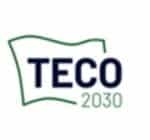TECO 2030 launches the world’s most compact and efficient inherently safe marine fuel cell system

TECO 2030 is pleased to elaborate on the world’s most power dense marine and heavy-duty fuel cell module, the FCM400. The FCM400 has already an Approval in Principle from DNV and currently undergoes type approval process for maritime and heavy-duty applications. FCM400 is inherently gas-safe to accommodate easy integration onboard a ship for zero emission energy generation.
TECO 2030 has developed hydrogen fuel cells that enable ships and other heavy-duty applications to become emissions-free, and the company is in the process of establishing Europe’s first Giga production facility for hydrogen PEM fuel cell stacks and modules in Narvik, Norway. Production of fuel cell stacks is already underway, and the commencement of module production is expected to start within the next few months. TECO 2030’s fuel cell stacks employ unique technologies developed together with technology partner, AVL, a forerunner in hydrogen applications, enabling industry-leading power density and performance.
TECO 2030’s world-class fuel cell system is a technologically advanced clean energy generation system. The attributes of the modular 400kW fuel cell system includes industry leading energy efficiency, inherent safety concept, leading dimensions and component design, lifetime, and rapid dynamic load response.
Safety is always the key priority. TECO 2030’s fuel cell system has been developed along with an inherent safety concept, this means that the design and operation of fuel cells minimize consequence of potential hazards. This includes a separate and independent safety system, venting arrangement, certified and field proven components, and robust containment systems.

TECO 2030 FCM400: Fuel Cell Module 400kW currently undergoing comprehensive test program TECO 2030
The FCM400 system has the lowest footprint on the market when calculating power output per unit volume, meaning that there is no other supplier of similar energy density for marine and heavy-duty applications. Real estate onboard a ship or similar sites is limited so the importance of energy density is key to many of TECO 2030’s clients and partners. The FCM400 has a dynamic load which relates to the ability of the fuel cell to rapidly respond to changes in power demand, which is important for mobility and grid applications were power requirements can change swiftly.
“I am proud to elaborate on our world-leading fuel cell technology on AVL’s 75th anniversary and showcase our FCM400 which is currently at their premises in Graz, Austria. A huge congratulations to AVL on their anniversary! There is no one in the world who has developed a fuel cell system with similar power efficiency, safety concept or power density as we have achieved. Our fuel cell isn’t just resilient, it is practically invincible and can be used for whatever high-power application needed. The system is easily scalable in power increments of 400kW, and can be utilized in multimegawatt power source applications,” says Tore Enger, Group CEO at TECO 2030.
“Our system is a standard and fully customizable fuel cell system that can be used in various applications such as marine main- or auxiliary engines, construction sites, stationary shore power applications and other energy intensive applications. TECO 2030 is at an exciting pivotal point in its development and are continuously looking for new potential partners, employees, and investors to work with, so we together can realize a common zero-emission future,” Enger concludes.
Source: TECO 2030
